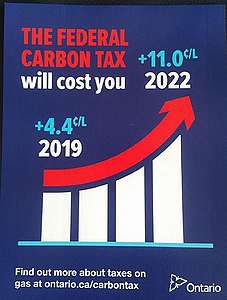The Ford government’s carbon tax stickers are now in the mail to gas stations across Ontario, even though the regulation requiring gas station operators to post the stickers (or face fines of up to $10,000 per day) doesn’t appear to have been finalized (as of August 15).

In July, we made the submission below in response to the Ontario government’s formal posting of the regulation for comment. We argued that the Federal Carbon Tax Transparency Stickers are an unconstitutional instance of compelled political speech because they force businesses to post information that is both misleading and partisan:
The stickers are misleading because they:
- Present false assessment of costs to households because stickers and related website ignore federal rebates and benefits of climate action;
- Highlight only the federal carbon tax and not other government taxes on gasoline hence aren’t fully transparent;
- The Ontario Court of Appeal has ruled the federal carbon price is not a tax, so it is inaccurate to describe them this way in a legally-required posting (there should be less room for colloquialisms when there’s a $10K/day penalty involved);
- Are inconsistent with the government’s obligations under the Environmental Bill of Rights
We also argued that they should be deemed partisan political advertising under Ontario’s Government Advertising Act because they use Conservative colours (explicitly forbidden in the Act).
The Canadian Civil Liberties Association has indicated that they will challenge the stickers on constitutional grounds.
Greenpeace Canada’s full submission to the Ontario government can be found below.
******************
On behalf of Greenpeace Canada, I would like to comment on the Proposed Regulation to be made under the Federal Carbon Tax Transparency Act, 2019, posted on Ontario’s Regulatory Registry as Proposal Number 19-ENDM006.
SUMMARY
We believe that this proposed regulation is unconstitutional and therefore should be abandoned. The proposed Federal Carbon Tax Transparency stickers present information that is misleading with respect to costs, benefits and whether the federal carbon price is in fact a tax. It is inconsistent with the Ministry’s Statement of Environmental Values adopted under the Environmental Bill of Rights. Further, the stickers should be deemed partisan political advertising under Ontario’s Government Advertising Act. Forcing businesses to post misleading and partisan information is a form of compelled political speech that is unconstitutional under the Canadian Charter of Rights and Freedoms.
BACKGROUND
Regulatory Proposal 19-ENDM006 states that “The purpose of the proposed regulation is to prescribe the notice (i.e., Federal Carbon Tax Transparency Sticker) to be obtained by gasoline retailers in Ontario and affixed to each retail gasoline pump. The stickers would be provided free of charge and sent by mail to retail outlets. Additional stickers would also be obtainable through a government website.”
It is unfortunate that the proposal does not include the most important part: a copy of the required sticker. The Government of Ontario has, however, published copies of the proposed sticker at media events and on page 207 of the 2019 provincial budget.
We believe that this proposed sticker is misleading because it does not include, either in the proposed sticker or the web page (Ontario.ca/carbontax) that it links to, the following facts:
1. The federal government has committed to rebating the cost of the carbon taxto households, so the data provided on the sticker and in the website section “It will cost a typical Ontario household:” is incorrect. The true cost (carbon tax paid – rebate) will be much lower or even net positive for households.
2. The sticker does not include the costs of inaction on climate change. Failing to include the costs of more extreme weather, rising seas, etc. distorts the cost/benefit assessment necessary to make an informed choice, which is why governments around the world use a “social cost of carbon” when evaluating the costs and benefits of environmental regulations and charges. According to Environment Canada, the “central” social cost of carbon is $51/tonne in 2020 (adjusted for inflation) and the “95th percentile” social cost of carbon in 2020 is $213/tonne. This translates into roughly 12.2 cents/L and 51 cents/L of gasoline respectively.
3. The stickers do not include other provincial and federal taxes applied to gasoline and diesel. To be truly transparent, any sticker posted showing the impact of the federal carbon price should in fairness include all fuel excise and sales taxes.
4. It is inaccurate to call the federal carbon price a “tax”, as the Ontario Court of Appeal has ruled that the federal carbon price is not a tax. From the Court’s ruling: “The charges imposed by the [federal government’s Greenhouse Gas Pollution Pricing Act] are themselves constitutional. They are regulatory in nature and connected to the purposes of the Act. They are not taxes.”
5. The Act fails to comply with the Environmental Bill of Rights. Whenever decisions are made that might significantly affect the environment, the Ministry needs to ensure that the Statement of Environmental Values (SEV) is considered. According to the Ministry’s SEV, the Ministry is to apply a series of principles including that the:
- The Ministry’s environmental protection strategy will place priority on preventing pollution and minimizing the creation of pollutants that can adversely affect the environment.
- The Ministry endeavours to have the perpetrator of pollution pay for the cost of clean up and rehabilitation consistent with the polluter pays principle.
- The Ministry will encourage increased transparency, timely reporting and enhanced ongoing engagement with the public as part of environmental decision-making.
This proposed regulation does not prioritize the goal of preventing pollution or minimize the creation of pollutants, nor is it supportive of the polluter pays principle. Without presenting tangible alternative options to carbon pricing, it in fact promotes the creation of pollutants. Instead of encouraging transparency, and enhanced ongoing engagement with the public as part of environmental decision-making, the misleading stickers are intended to sow misinformation and appears to contradict the EBR and SEV altogether. This regulation does nothing to protect the environment or human health.
Furthermore, when determining the effect of a proposal on the environment (according to s. 14), the minister shall consider:
- The extent and nature of the measures that might be required to mitigate or prevent any harm to the environment that could result from a decision whether or not to implement the proposal.
- The geographic extent, whether local, regional or provincial, of any harm to the environment that could result from a decision whether or not to implement the proposal.
- The nature of the private and public interests, including governmental interests, involved in the decision whether or not to implement the proposal.
- Any other matter that the Minister considers relevant.
This proposed regulation is not required to mitigate or prevent harm to the environment, but on the contrary could mislead Ontarians about the impacts of carbon pricing, lead to future harm, and impede any future attempts for environmental protection through financial regulatory measures. It does not have any inherent public interest as it does not support any environmental, sustainability, or climate change initiatives; promote environmental protection, or mitigate any harm.
6. We believe that the proposed sticker should be deemed “partisan advertising” under Section 6.2.D of Ontario’s Government Advertising Actbecause “it includes, to a significant degree, a colour associated with the governing party.”
Given this combination of misleading information and partisan advertising, we are concerned that the proposed stickers that would be legally required to be posted under this regulation are a form of compelled political speech. Compelled political speech is unconstitutional under Section 2.b. of the Canadian Charter of Rights and Freedoms.
For these reasons, we do not believe this regulation should be adopted.




Discussion
Right on! Thank you. Is there a list of gas stations that are refusing to post the stickers? This is so breathtakingly fascistic of Ford. Where are the real conservatives today, who value our actual traditions of non-partisan governance and the rule of law? These guys are flaming-radical yahoo freaks who think they now own the place because a minority of Ontarians voted for them.
"He who accepts evil without protesting against it is really cooperating with it.” quote by MLK Is Ford truly evil? Time will tell. Dishonesty has always been one of the favourite tools of the despot. All Ontario residents must watch this government closely and hold them accountable for their actions.
Yup such a lie +11 cents by 2022 yet it's went up 30 cents in the last 6 months